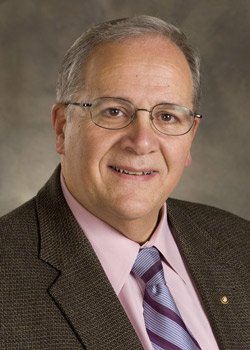A scary, but successful prostate cancer journey

Like most men his age, 75-year-old South Yarmouth resident Kenneth Sheytanian has been getting yearly PSA tests as part of his annual physical with his primary care provider Mario Zacharatos, MD. When his numbers were higher than expected, Dr. Zacharatos monitored them and, when they inched up further, he referred Sheytanian to urologist Brian Kowal, MD, at Urology Associates of Cape Cod.
Dr. Zacharatos and Dr. Kowal conferred and both agreed that Sheytanian needed a biopsy, and he received the answer he was dreading on St. Patrick’s Day of last year.
“The results were staggering,” he said. “Out of the 21 sample biopsies they took, they were all high levels, so that made me feel even worse.”
Sheytanian asked his urologist at Mass General if he should travel to Boston for his treatment, and his doctor highly recommended that Sheytanian get his cancer care at Cape Cod Hospital (CCH). He cited the hospital’s excellent reputation and the fact that CCH has the same treatment equipment as the Boston hospitals.
Radiation oncologist Ethan Glazener, MD, who is Sheytanian’s CCH physician, said he assured Sheytanian that, while he has no problem referring patients to Boston, if they want a second opinion or need a procedure he can’t do on the Cape, patients will receive top-level care here.
“I think patients here on Cape should be aware that we’re not antagonistic to Boston,” he said. “But we also aren’t like a little kid brother, either. We do what we do here professionally and to the highest level that you would expect anywhere. That was part of the reason I took this job. The photon linear accelerator machines we have at Falmouth Hospital and at Cape Cod Hospital are equivalent to or better than anything I ever used in Los Angeles.”

Ken Sheytanian, 75, reflects on his journey through prostate cancer treatment.
It didn’t take Sheytanian very long to see that his level of care would be exceptional. Dr. Glazener promised to give him as much time as he needed to ask questions and talk over the treatment decisions he needed to make. He was also impressed with the great compassion Dr. Glazener showed toward him.
“Every step, every minute, every hour that I took during this whole procedure was even more amazing to me, because Dr. Glazener and his staff explained it exactly as it rolled out,” he said. “There were no surprises anywhere.”
A Menu of Treatment Options
Sheytanian had an intermediate risk prostate cancer, Dr. Glazener said, explaining that prostate cancer is categorized by risk stratification rather than staging.
“We use several factors to decide which risk group they belong to and then, once we know what risk group they belong to, we kind of have a menu of treatment options,” he said. “I always share with my patients a website called NCCN.org. NCCN is the National Comprehensive Cancer Network. It’s kind of like a Wikipedia for cancer care.”
NCCN has a section for clinicians and another section for patients and both can find up-to-date clinical guidelines for just about every type of cancer there is. Sheytanian had the option to have surgery or to do six months of hormone therapy with radiation therapy. He opted to do the latter.
“During those consultations, I gave him a lot of information about what to expect, what the treatments would entail, what the experience would be like every day as he comes in for these treatments, as well as the expected short- and long-term side effects,” Dr. Glazner said. “I try to paint a picture for them about what it’s going to look like in the ensuing months and how we’re going to keep following him and what to expect.”
Successful Treatment
Sheytanian had 20 radiation treatments last year and they were successful. Dr. Glazener saw him a few weeks ago for a follow-up and was happy to report that his testosterone levels were back where they should be, and his PSA number was exceedingly low.
“I shared with him that’s kind of the best of both worlds, and he is in remission,” Dr. Glazener said. “I do share with my patients, him included, that it’s a bit of a marathon and not a sprint with prostate cancer. He has a very good likelihood of being cured but we are going to continue to monitor him closely.”
He also shared information about the PROTECT trial that showed one of three options for treatment for prostate patients - either active surveillance, surgery or radiation - results in very low number of deaths over the course of 15 years of surveillance.
“I told Kenneth that I don’t know for certain you’re cured and we’re going to monitor you consistently but what I can share is the odds are incredibly in your favor that you won’t be dying of this disease any time soon, if at all,” Dr. Glazener said.
Sheytanian said he felt very well supported by his whole medical team. He felt like they cared for him in a way he hasn’t ever felt by anyone who wasn’t family.
“The whole team was really behind me,” he said. “I really owe my success so far to the doctors down here and Cape Cod Hospital, and especially to Dr. Glazener.”
